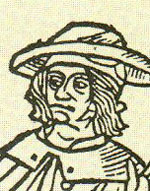Mots Français
Fifteenth CenturyJeanne d'Arc (1412-1431)
The exploits of Joan the Maid in organizing resistance to the occupying English in the Hundred Years' War, and in encouraging Charles the Dauphin to assume the throne of France, as a pivot of that resistance (he was crowned at Reims as Charles VII in 1429), are preserved in the written records of her trial, by a French ecclesiastical court in the English zone. Her agility in steering past the attempted theological entrapment, throughout the protracted sessions, has won the hearts of posterity on both sides of the battle lines. Never did a gang of lawyers appear to less advantage in their own transcript. At one point she was asked why her battle flag had been displayed more prominently than others at the coronation ceremony in Reims:Il avait été à la peine, c'etait bien raison qu'il fût à l'honneur (17 March 1431)
It had had the pain; there was reason enough it should have had the honorFrançois Villon (1431-1463?)
The chivalric throwback and the modern harbinger meet in 1431. Villon, born that year, is the first unambiguous spokesman for the coming age. His life was was suitably dysfunctional. He was the adopted son of the Chaplain of St Benoît-le-Rétournée, a church now marked only by a plaque behind the Collège de France, on the Rue Saint-Jacques. He studied at the Sorbonne (just up a little and across the Rue Saint-Jacques from St Benoît), and qualified for a degree of clerical status which put him under canon law rather than common law. He early became a rogue and a vagabond, as though seeking to define life from the bottom up. He committed his first murder in 1455, and was banished from Paris. He took up with the coquillards, a band of thieves who were active in France at the close of the Hundred Years War. He was frequently imprisoned, and, almost as frequently, avoided serious punishment by appeal to his technically clerical status. He composed highly personal and yet also enduringly universal poetry, in a language that is not yet modern French, but resonates in the French consciousness; indeed, the world consciousness. This Ballade des Dames du Temps Jadis, with its sense of distance from the poetic past, is from 1461:Mais où sont les neiges d'antan?
But where are the snows of yesteryear?For an annotated text of the complete poem, click here. The poem from which the plaque on the Rue Saint-Jacques quotes, however, is elsewhere in Villon's Grant Testament. It is the more elemental Ballade of the Hanged, which begins
Frères humains qui après nous vivez
O Brother men, who live, though we are gone,
25 Dec 2005 / Contact The Project / Exit to French Index Page

